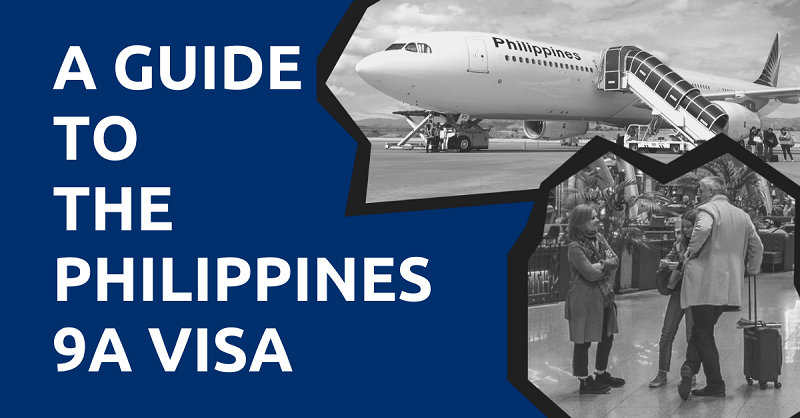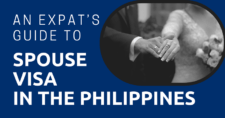
A tourist visa is also called a Philippines 9A visa or a temporary tourist visa. A single-entry tourist visa is valid for up to 30 days and allows you to go to the Philippines for leisure, business trips, religious pilgrimages, sightseeing, or health reasons. You can apply for it through a Philippine consulate or embassy in your country.
Foreign nationals who are subjects of deportation or blacklist orders of the Department of Foreign Affairs and the Bureau of Immigration cannot apply for a tourist visa and cannot be admitted to the Philippines.
Pandemic update: The Philippine government has imposed restrictions on who can enter the country and the list of countries eligible for admission periodically changes. You can check for the latest updates regarding travel restrictions at the Bureau of Immigration website.
This article will take approximately 12 minutes to read. Don't have the time right now? No worries. You can email the ad-free version of the article to yourself and read it later!
Disclaimer: This article may include links to products or services offered by ExpatDen’s partners, which give us commissions when you click on them. Although this may influence how they appear in the text, we only recommend solutions that we would use in your situation. Read more in our Advertising Disclosure.
Contents
What You Can Do With a Tourist Visa
If you are a tourist visa holder, you can rent a car in the Philippines for up to 90 days so you can explore the country at your own pace. Rental companies may require you to present your passport, a major credit card, and a valid driver’s license from your home country provided that the license is written in English.

You can also open a foreign currency deposit account in the Philippines but not a Peso deposit account. You can only open a Peso deposit account if you’ve been living in the Philippines for more than 180 days. You can check with the nearest local bank about the requirements for opening bank accounts as they differ according to the bank.
You can also rent a condominium or a house but cannot buy land or a house and lot. You can also legally buy condo units as long as 60% of the building is owned by Filipinos.
Types of Temporary Visas
You can apply for a tourist visa if you want to visit the Philippines to spend your holidays in the tropics. You can also visit the Philippines if you want to avail of medical tourism provided that you are getting treatment for a non-contagious or non-communicable disease.
Single-Entry Tourist Visa
A single-entry tourist visa is valid for three months and allows you to stay in the Philippines for a maximum of 59 days. Once you exit the Philippines, you need to apply for another visa if you wish to re-enter the country even if the previous tourist visa is still valid.
Multiple-Entry Tourist Visa
A multiple-entry tourist visa is valid for six months and allows you to stay in the Philippines for a maximum of 59 days per stay. Before the 59 days are over, you need to exit the country and re-enter to reset the 59-day period for staying in the Philippines. You can exit and re-enter the country an unlimited number of times within the six months validity of the visa.
Visa Exemption
Citizens from specific countries can stay in the Philippines without a visa for a maximum of 30 days as long as they hold a valid return ticket.
Among the visa-exempted countries, citizens of Brazil or Israel can stay in the Philippines for a maximum of 59 days without a tourist visa.
Visa Upon Arrival (SEVUA)
Visa upon arrival (SEVUA) is a special type of visa available to individuals visiting the country in an official capacity, such as athletes or delegates to sports competitions, participants in international conventions, and others identified by the Bureau of Immigration.
Tourist Visa Fees
The visa fee for a single entry tourist visa is ₱1,500 (around $30) for regular processing time of 7-14 working days or ₱2,000 (around $40) for expedited processing time of 3-5 working days.
A multiple-entry tourist visa valid for 6 months costs ₱3,000 (around $60) while a multiple-entry tourist visa valid for 12 months costs ₱4,500 (around $90).
The maximum stay in the Philippines per entry is 59 days so you’ll need to exit the country and re-enter or apply for an Extension of Stay.
Philippine Immigration Requirements for Tourist Visa
If you want to apply for a tourist or temporary visitor’s visa, be sure to bring the following documents:
Passport
Your passport needs to be valid at least 6 months after your expected stay in the Philippines. If your passport is about to expire or will expire during your stay in the Philippines, be sure to renew your passport in your country’s foreign affairs office before applying for a Philippine tourist visa.
You also need to ensure that you have enough blank pages in your passport for your visa stamp. Renew your passport if you have less than two blank pages to avoid problems with the immigration officer at the point of entry.
Visa Application Form
Download and fill up a visa application form. Be sure to avoid any erasures which could place your application into question.
Confirmed Return Tickets
Photocopy of confirmed tickets back to your own country or your next country of destination.
Passport Photos
Two pieces of passport photos measuring 2×2 inches with a white background.
Proof of Financial Capacity
You need to prove that you can financially support yourself during your stay in the Philippines. You can present the latest print-out of your credit card account, the latest print-out of your bank statement, or documents proving ownership of real estate properties.
Check with the Philippine consulate in your home country because the consulate may require more than one document proving your financial capacity.
A general rule of thumb is to have an equivalent of $200 per day that you intend to stay in the Philippines. For example, if you plan on staying in the Philippines for 7 days, you need to present proof that you have a minimum of $1,400 in your bank account.
Waiver of Exclusion Grounds
This is a required document for children below 15 years old who will travel to the Philippines alone or without a parent or legal guardian.
Although the list above includes the standard requirements for the application, the visa officer may request additional documents at his or her discretion.
Applying For Tourist Visa
If you are applying for a tourist visa, you can do so in person or by mail. You can proceed to the Philippine Embassy or Consulate in your home country.
If the applicant is a minor below 18 years of age, the applicant’s parents or legal guardians may process the application on the applicant’s behalf. The visa officer may require the applicant and the person applying on behalf of the minor to physically appear at the embassy or the consulate for an interview.
Call the Philippine Embassy or Consulate in your home country to schedule an application or ask for requirements for a tourist visa application.
The entire application process can take up to 10 working days to complete, depending on the embassy or consulate where you submitted your application.
To avoid any delays, ensure that your application is in order and that you submit all the required documents. It is also best to apply for a visa ahead of your planned travel date to ensure that you receive your visa on time.
Overstaying
Your tourist visa will remain valid and allow you to stay in the Philippines if you don’t violate its provisions.
Extend your visa at least a week ahead of its expiration. Overstaying has a corresponding standard penalty of ₱2,000 (around $40) per month. If you overstayed for less than 6 months, you need to settle your overstay fees and fines at the Bureau of Immigration before you can leave the country. If you overstayed for more than 6 months, you need to settle your fines and fees at the BI and obtain an Emigration Clearance Certificate (ECC).
Overstaying for more than 12 months means that before you can settle your fines and get your ECC, you need to obtain a clearance from the National Bureau of Investigation (NBI). An NBI Clearance costs ₱130 or around $2.60 and is proof that you don’t have any criminal records during your stay in the country.
Extension of Stay
A visa waiver will allow you to extend your stay in the country for an additional 29 days if your initial visa is valid for 30 days. Be sure to submit your application at least one week before the end of your stay.
You can also apply for an Extension of Stay if you have already been in the country for 59 days and want to stay longer. To do this, you need to proceed to the Bureau of Immigration and present your original passport, an accomplished form (TVS-CGAF-VE-2016), and a sworn statement for updating your stay.
You need to pay a fee of ₱500 per month and other fees such as:
- Application fee – ₱300 or around $6
- Alien Certificate of Registration Fee – ₱500 or around $10
- Certification Fee – ₱500 or around $10
- Emigration Clearance Certificate – ₱200 or around $4
- Legal Research Fee – ₱50 or around $1
- Visa Sticker Fee – ₱100 or around $2
Cancellation
Before going to the Philippines, try to learn more about the country, its culture, and its customs so you can make the most out of your stay. On top of making your stay more memorable, violating local customs and regulations can result in the revocation of your visa and possible deportation.

A simple rule of thumb is to not do something that you wouldn’t normally do in your home country (except smoking cannabis if it is legal in your country because using cannabis is illegal in the Philippines).
Successfully securing a tourist visa doesn’t mean that you are guaranteed entry into the country because there are instances of visa cancellation at the port of entry.
The immigration officer can cancel your visa if the officer finds out that you used falsified documents or provided false information during your visa application.
Visa cancellation is also possible if you are non-compliant with the conditions of your visa. An example is if you have a tourist visa but decided to work during your stay in the Philippines. You need a work visa or a provisional work permit if you plan to seek employment during your stay in the Philippines.
You can also voluntarily request the cancellation of your visa if you no longer want to go to the Philippines. There is no cancellation fee but you cannot request a refund of your visa application fees.
Changing From One Visa Type to Another
It is possible to change your tourist visa to a work visa if you want to work in the Philippines, but you need to apply for a provisional work permit at the Bureau of Immigration first. You need to personally appear at the Bureau of Immigration to facilitate your request. Be sure to bring the required documents and an accomplished application form.
Take note that changing an immigrant visa to a tourist visa is required for immigrant visa holders who no longer wish to stay in the Philippines. Common reasons include the termination of the marriage to a Filipino spouse or the end of an employment contract.
One of the requirements to cancel an immigrant visa is to cancel the Alien Certificate of Registration Identity Cards (ACR I-Card). To do so, you will be required to change your immigrant visa to a tourist visa first.
Now, on to You
If you want to visit the Philippines to enjoy its amazing beaches and awe-inspiring natural wonders, a tourist visa is a must. Or you can take advantage of the visa-exempt privileges that your home country is accorded with. Although the processing and requirements may seem daunting, with the right information, you can apply for your tourist visa with minimal stress and hassle.






